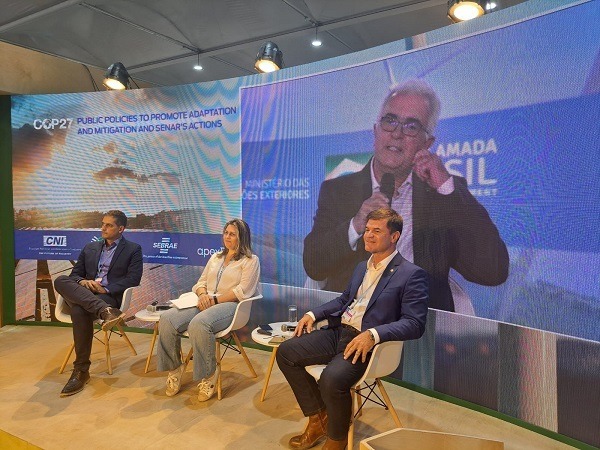The CNA/SENAR System was present at the panels and debates promoted for two weeks at the 27th United Nations Conference on Climate Change (COP 27), held in Sharm El-Sheik, Egypt. One of the main goals of the CNA delegation was to show the world the relevance of Brazilian rural producers in the debates about climate and the commitment to sustainability in Brazil’s agriculture in food production using clean energy, as well as in decarbonization solutions compatible with the need to resume economic growth with fewer emissions.
The Brazilian stall had a comprehensive program, promoting meetings and the exchange of relevant information, having devoted one day (November 14th) to panels exclusively about agribusiness. At the meeting, exhibitors highlighted the importance of producers and governments working together so that agriculture and cattle-raising are part of the solution to the issues of mitigation and adaptation to the effects of climate change worldwide.
In one of the panels, CNA’s Vice-president of International Relations, Gedeão Pereira, emphasized the role of MERCOSUR countries, which have increased their production with technology, in ensuring global food security, supplying food mainly to countries in Africa, the Middle East, and Asia, in a healthy, sustainable, and environmentally safe way. “Food security and climate security are two interconnected issues. We can ensure food to the world, which today demands more and more products aligned with climate security. And we have to keep on producing with investment, to show that we have one of the most environmentally friendly agricultural sectors,” he said.

The panel included the Representative of the National Farmers Federation of Australia (NFF), Michele Macdoch, the Representative of the United States Department of Agriculture (USDA), Jeremy Adamson, and the Director of Climate, Nature, and Energy at the UK Embassy to Brazil, Bruna Cerqueira, as well as the Technical and Legal Consultant of CNA’s National Commission for the Environment, Rodrigo Justus, and the Secretary of Innovation, Sustainable Development and Irrigation of the Brazilian Ministry of Agriculture (MAPA), Cleber Soares.
Another program highlight was the panel “Food Security Is Peace,” which had as its main guest the Pakistani scientist Rattan Lal, laureate of the Nobel Peace Prize in 2007 and the World Food Prize in 2020. Acknowledged for his work on regenerative and sustainable agriculture for soil preservation as a key factor for global issues, Rattan Lal stressed the importance of developing innovative systems to restore the environment.
According to him, Brazil can play a crucial role in this process by using natural resources and intelligent agriculture, turning it into a more efficient activity. “Brazil can be a global leadership model for carbon sequestration. The soil is the foundation for this goal, and we hope that COP will have decisions focused on this issue,” he said.
The President of CNA’s National Environment Commission, Muni Lourenço, was also present at the meeting and highlighted that Brazil’s acknowledgment as an agriculture, environment, and energy powerhouse—due to the work of science and technology and much of this knowledge—had the Nobel Peace scientist as a reference. “All this proves that environmental sustainability and food security go together,” he said.
ABC Plan’s Future
The Head of the MAPA’s Climate and Sustainable Agriculture Division, Eleneide Doff, was present at another significant panel and talked about the Sector Plan for Adaptation to Climate Change and Low Carbon Emission in Agriculture and Livestock 2020-2030 (ABC+), aimed at the sustainable development of agriculture, mitigation of greenhouse gas (GEE) emissions, and the change in Brazilian agriculture.
The ABC+ is the second stage of the ABC Plan, launched in 2010 and concluded in 2018, with the implementation of low carbon emission technologies in 52 million hectares and the mitigation of 170 million tons of CO2eq. “The ABC has become one of the most successful policies in the world in the agricultural sector. Due to the lessons learned in its first stage and the new international challenges and new Brazilian commitments, the ABC+ was launched with an integrated approach to landscape and bringing a more sustainable, resilient, and effective production.”

Negotiations
On Monday (14), CNA’s delegation met Minister Paulino Franco de Carvalho Neto, Secretary of Multilateral Political Affairs at the Ministry of Foreign Affairs (MRE), who is part of the Brazilian government’s negotiating team at the Conference.
At the meeting, the President of the Environment Commission, Muni Lourenço, CNA’s Vice-president of International Relations, Gedeão Pereira, and The president of the Federation of Agriculture and Livestock of the State of Minas Gerais (FAEMG), Antônio Pitangui de Salvo, delivered a document containing the Brazilian agricultural sector stand regarding climate issues.
CNA highlights five relevant subjects in Brazil’s stand for COP-27 delivered to the national government: a new quantified goal for climate finance; mechanisms focusing on adaptation; the adoption of the action plan for agriculture, a result of the negotiations in Koronívia; the implementation of carbon market tools; and general recommendations to the Brazilian negotiators.